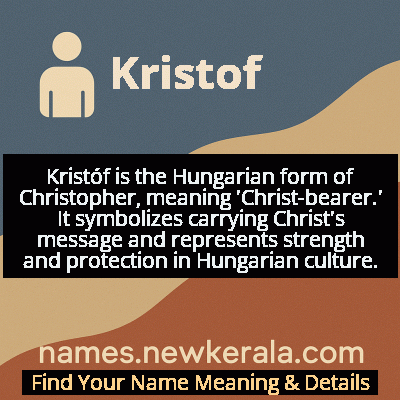Kristof Name Meaning & Details
Origin, Popularity, Numerology Analysis & Name Meaning of Kristof
Discover the origin, meaning, and cultural significance of the name KRISTOF. Delve into its historical roots and explore the lasting impact it has had on communities and traditions.
Name
Kristof
Gender
Male
Origin
Hungarian
Lucky Number
8
Meaning of the Name - Kristof
Kristóf is the Hungarian form of Christopher, meaning 'Christ-bearer.' It symbolizes carrying Christ's message and represents strength and protection in Hungarian culture.
Kristof - Complete Numerology Analysis
Your Numerology Number
Based on Pythagorean Numerology System
Ruling Planet
Saturn
Positive Nature
Ambitious, efficient, realistic, and authoritative.
Negative Traits
Materialistic, stressed, confrontational, and can be overly ambitious.
Lucky Colours
Dark blue, black.
Lucky Days
Saturday.
Lucky Stones
Blue sapphire, amethyst.
Harmony Numbers
2, 4, 6.
Best Suited Professions
Business leaders, managers, financial services, law enforcement.
What People Like About You
Leadership, determination, organizational skills.
Famous People Named Kristof
Kristóf Baráti
Violinist
Internationally acclaimed Hungarian violinist known for his interpretations of Bach and contemporary Hungarian composers
Kristóf Szalay-Bobrovniczky
Politician
Hungarian Minister of Defense and former diplomat
Kristóf Milák
Swimmer
Hungarian Olympic gold medalist and world record holder in butterfly swimming events
Kristóf Kelemen
Actor
Prominent Hungarian theater and film actor known for his versatile performances
Name Variations & International Equivalents
Click on blue names to explore their detailed meanings. Gray names with will be available soon.
Cultural & Historical Significance
During the Ottoman occupation and subsequent national revival movements, Christian names like Kristóf gained additional significance as symbols of European Christian heritage and resistance to foreign domination. In the 20th century, the name maintained its popularity despite political changes, demonstrating its deep roots in Hungarian society. Today, it represents a connection to Hungary's historical Christian traditions while remaining accessible and modern, making it a bridge between generations and cultural epochs in Hungarian family life.
Extended Personality Analysis
Individuals named Kristóf are often perceived as strong, reliable, and principled, reflecting the name's meaning of 'Christ-bearer.' They tend to be natural leaders with a protective instinct toward others, embodying the legendary strength of Saint Christopher who carried travelers across dangerous waters. Kristófs are typically known for their determination and steadfastness in pursuing their goals, combined with a practical approach to problem-solving. Many display a blend of traditional values and modern adaptability, making them respected in both professional and personal contexts.
Their personality often includes a quiet confidence rather than overt showmanship, with many developing strong analytical skills and attention to detail. The name suggests someone who carries responsibility well and can be counted on in challenging situations. Kristófs are frequently described as having a calm demeanor under pressure and the ability to think strategically when others might panic. They tend to form deep, lasting relationships and are often the stabilizing force in their social and family circles, embodying the protective qualities associated with their namesake saint.
Modern Usage & Popularity
In contemporary Hungary, Kristóf remains a popular and well-established male name, consistently ranking among the top 50 male names for newborns. While its peak popularity occurred in the 1980s and 1990s, it maintains steady usage due to its traditional roots and modern appeal. The name is particularly favored by educated urban families who appreciate its historical significance while finding it sufficiently contemporary. Recent trends show a slight decline in absolute numbers but continued strong cultural presence, with many parents choosing it as a middle name when opting for more fashionable first names. The name crosses generational boundaries well, being equally suitable for children and respected in professional contexts for adults, ensuring its continued relevance in Hungarian society.
Symbolic & Spiritual Meanings
Symbolically, Kristóf represents strength, protection, and spiritual guidance, drawing from the legend of Saint Christopher carrying the Christ child across a river. The name embodies the concept of bearing responsibility and providing safe passage through life's challenges. In Hungarian cultural context, it also symbolizes national continuity and the preservation of Christian heritage through centuries of historical turbulence. Metaphorically, Kristóf suggests a bridge between tradition and modernity, carrying forward cultural values while adapting to contemporary realities. The name implies steadfastness in adversity and the capacity to support others during difficult transitions, making it symbolic of reliability and moral fortitude in Hungarian society. It represents the idea of being a pillar of strength for one's community and family.

